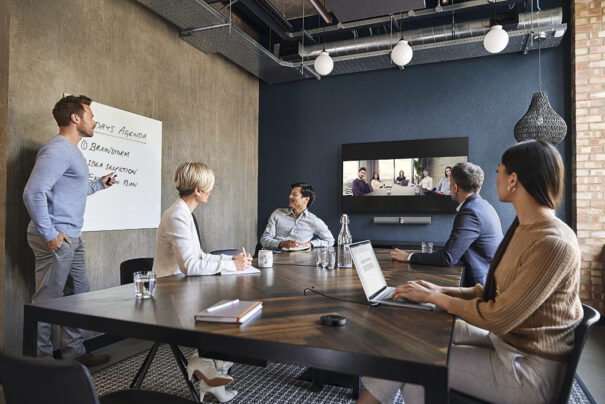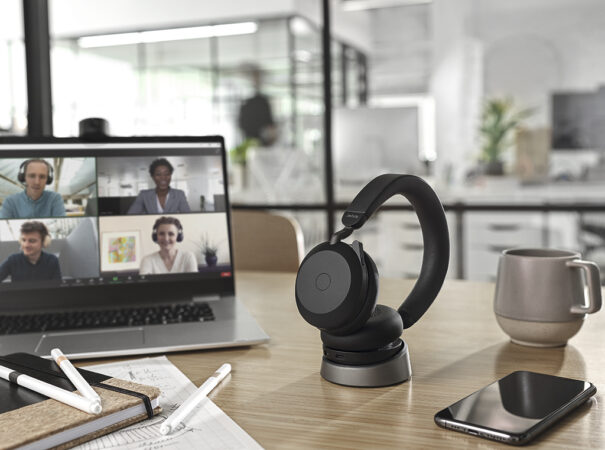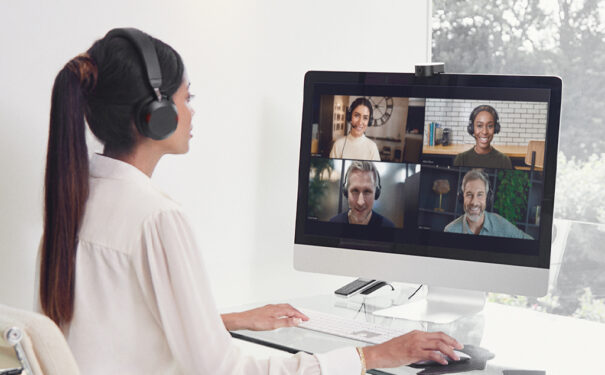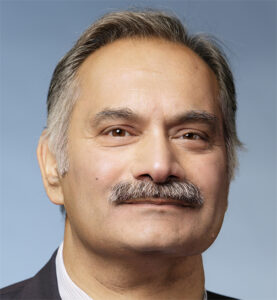Jabra: Retorno del teletrabajo y plan de actuación
En este artículo se explica cómo la nueva normalidad ha hecho que haya que adaptarse a nuevas formas de vídeo inteligente y reuniones virtuales. Han cambiado los modelos de trabajo, las formas de reunirse y las relaciones laborales.
La llegada de la pandemia hace dos años ha traído nuevos modelos de trabajo, nuevas formas de reunirse y en consecuencia un cambio en las relaciones laborales.
Lo que antes era una reunión en una sala con 20 personas, ahora es a través de videoconferencias mediante distintos programas como Zoom o Microsoft Teams. La nueva normalidad en la que convivimos actualmente ha condicionado nuestras relaciones sociales incluso en el trabajo, y tomarse un café o comer en el trabajo ha desaparecido o debe hacerse bajo ciertas medidas de seguridad.
Las nuevas formas de reunirse a través de videoconferencias han tenido como consecuencia el aislamiento de los departamentos dentro de la empresa. La distancia social, los nuevos protocolos corporativos o el teletrabajo dificultan el socializar y relacionarnos con nuestros compañeros de trabajo en los pasillos, zonas del café o a la hora de comer.
Es necesario replantearse la distribución de las oficinas y apostar por espacios de trabajos diáfanos y cien por cien tecnológicamente equipados. De esta manera se facilitará una colaboración eficiente, tanto cara a cara como remotamente, al mismo tiempo que las relaciones entre compañeros.
Según apunta Holger Reisinger, vicepresidente sénior de Soluciones para Grandes Empresas de Jabra: “cada espacio abierto debe tener un canal de vídeo para incluir a los trabajadores remotos y así intercambiar ideas, de la forma más natural, ya sea en proyectos comunes o en un momento de desconexión como puede ser tomando un café. Los canales de vídeo abiertos permitirán que la experiencia social sea la óptima para alcanzar el éxito en el trabajo híbrido”.
Promover el trabajo híbrido no solo implica disponer de una excelente infraestructura tecnológica, sino también asegurarse de disfrutar de una buena la experiencia social a la hora de colaborar. La base para ello empieza con excelentes prácticas en gestión de personal, que pueden ser enriquecidas con datos, donde abundan las herramientas tecnológicas disponibles.
Las medidas reforzadas con los canales de vídeo abiertos se caracterizan por proporcionar la experiencia social necesaria para optimizar la colaboración interdepartamental sin importar la locación de sus integrantes.
La inteligencia emocional y la empatía nunca han tenido tanta relevancia como ahora; tal y como afirma Holger Reisinger, “los líderes tienen que transmitir, a través de llamadas de vídeo, lo que tradicionalmente se ha hecho en persona. Tienen que mostrar que se preocupan por el bienestar de sus empleados, y una de las formas de hacerlo es proporcionando técnicas y herramientas que los empleados puedan utilizar para medir sus propias actividades y sus niveles de estrés”.
La nueva normalidad requiere nuevas tecnologías
En un mundo en el que estamos separados a la hora de trabajar, los gerentes de instalaciones desempeñan un papel fundamental para ayudar a las empresas a lograr un excelente audio y vídeo para las reuniones en la oficina. But, quizás lo más importante es que los gerentes de instalaciones necesitan encontrar formas inteligentes de hacer que las oficinas y los espacios de reuniones sean más seguros para todos los que los utilizan.
Al implementar nueva tecnología en oficinas seguras de COVID, los gerentes de instalaciones ayudarán a las personas a reunirse de manera segura tanto en persona como de forma remota, antes de lo que imaginamos.
Además, identificar gestos puede convertirse en un valor añadido muy poderoso y práctico a la hora de implementar la forma de trabajo híbrida en las empresas, gracias al desarrollo de los sistemas de vídeo inteligentes para recopilar datos más avanzados sobre el lenguaje corporal y las señales no verbales.
Aurangzeb Khan, explains: “si una mano levantada real puede activar automáticamente un widget de “mano levantada” en el sistema de colaboración virtual, esto permite a los participantes de la llamada hacer lo que instintivamente hacen como humanos, en lugar de hacer clic en una mano digital”.
La nueva normalidad nos lleva a adaptarnos a nuevas formas de vídeo inteligente y a nuevas formas de reuniones virtuales. Si estamos equipados con una buena tecnología, que nos ayude a solventar las necesidades actuales, podremos hacer que la vuelta a la oficina sea un proceso sencillo.
Holger Reisinger
Vicepresidente sénior de Soluciones para Grandes Empresas de Jabra
Aurangzeb Khan
Vicepresidente sénior de Sistemas de Visión Inteligente en Jabra
Did you like this article?
Subscribe to our NEWSLETTER and you won't miss anything.







